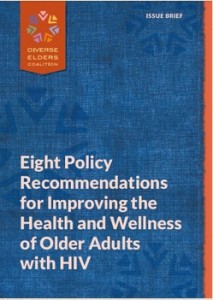Diverse older adults with HIV are living longer lives.
From the first known cases of the HIV epidemic in 1981 until the mid-1990s, most people diagnosed with HIV faced death within a few years, if not much sooner. Yet with the advent of effective anti-retroviral treatments, HIV has become a more manageable chronic illness over the last two decades, as evidenced by the increasing numbers of older people living and aging with HIV. The disease continues to disproportionately affect diverse people, as somestudies have found that gay and bisexual men are 44 times more likely to contract HIV than other men, while African Americans and Latinos are 12 and 5 times more likely to be HIV positive than their peers.
 Research estimates predict that 50 percent of people with HIV in the U.S. will be age 50 and older by 2015—and by 2020, more than 70 percent of Americans with HIV are expected to 50 and older. While individuals with HIV/AIDS are living longer lives, older adults have more than three other (usually chronic) health conditions in addition to HIV versus their age peers without HIV. As a result, they have a host of health and services needs that neither HIV nor aging services providers are fully prepared to meet. However, older adults have rarely been targeted in HIV/AIDS prevention and awareness campaigns. As a result, many do not realize that their behaviors can put them at risk for HIV infection. Additionally, health care providers may mistakenly assume that older patients are no longer engaged in high risk behaviors, and therefore do not initiate conversation about the importance of using protection and getting tested regularly. Moreover, older adults with HIV are often omitted from major legislation, policy initiatives and programs—from the White House Conference on Aging, to the Older Americans Act and the Ryan White CARE Act, to the Medicaid expansion made available through the Affordable Care Act, and more. Left unaddressed, generations of older adults with HIV will lack the supports they need to age in good health.
Research estimates predict that 50 percent of people with HIV in the U.S. will be age 50 and older by 2015—and by 2020, more than 70 percent of Americans with HIV are expected to 50 and older. While individuals with HIV/AIDS are living longer lives, older adults have more than three other (usually chronic) health conditions in addition to HIV versus their age peers without HIV. As a result, they have a host of health and services needs that neither HIV nor aging services providers are fully prepared to meet. However, older adults have rarely been targeted in HIV/AIDS prevention and awareness campaigns. As a result, many do not realize that their behaviors can put them at risk for HIV infection. Additionally, health care providers may mistakenly assume that older patients are no longer engaged in high risk behaviors, and therefore do not initiate conversation about the importance of using protection and getting tested regularly. Moreover, older adults with HIV are often omitted from major legislation, policy initiatives and programs—from the White House Conference on Aging, to the Older Americans Act and the Ryan White CARE Act, to the Medicaid expansion made available through the Affordable Care Act, and more. Left unaddressed, generations of older adults with HIV will lack the supports they need to age in good health.
The Diverse Elders Coalition is responding to this need by providing our communities with a variety of resources to help them get tested and get care. This Saturday, June 27th, is National HIV Testing Day. The CDC’s Act Against AIDS campaign has a website where users can find a fast, free, and confidential HIV testing facility in their area. Act Against AIDS also has a texting service: mobile users can simply text their zip code to KNOWIT (566948) to get the name, address and phone number of the nearest testing center.

Download our original policy brief, “Eight Policy Recommendations for Improving the Health and Wellness of Older Adults with HIV.”
Recognizing that the HIV/AIDS epidemic has disproportionately affected communities of color and LGBT people since its beginning, the Diverse Elders Coalition released an original policy brief, Eight Policy Recommendations for Improving the Health and Wellness of Older Adults with HIV. Download the report by clicking here. Additionally, we have created a website featuring a variety of consumer resources on HIV and Aging from both the Diverse Elders Coalition and its five member organizations. Click here to visit this website and browse the archive.
We encourage our readers to learn about HIV, discuss HIV/AIDS with their families and communities, get tested, and get care. There are a number of stories from diverse elders in our Diverse Elders Stories Initiative about older adults living — and thriving — with HIV. We’re inspired by these stories and the great work their authors have done to end HIV stigma among older adults. If you’re feeling inspired, too, you can share your story with us here.
The opinions expressed in this article are those of the author and do not necessarily reflect those of the Diverse Elders Coalition.

